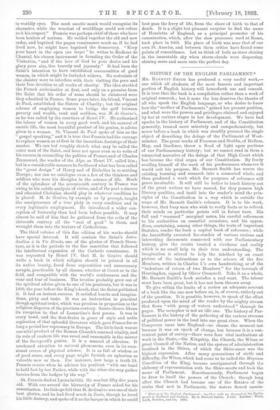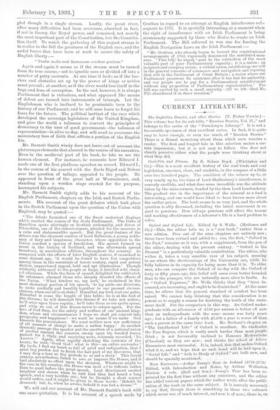HISTORY OF THE ENGLISH PARLIAMENT.* Mn. BARNETT SMITH has produced
a very useful work,— one which all students of the most famous and important portion of English history will henceforth use and consult. It is true that the book is a compilation rather than a work of original research ; but it none the less deserves the thanks of all who speak the English language, or who desire to know how the "mother of Parliaments gained her present position, and what were the powers and privileges claimed and enjoyed by her at various stages in her development. We have had epochs in the history of Parliament, and of the Constitution generally, treated more minutely and comprehensively, but never before a book in which was steadily pursued the single object of describing the doings of the Parliament of West- minster. The great works of Freeman and Stubbs, of Hallam, May, and Gardiner, throw a flood of light upon portions of our Parliamentary history ; but we cannot read in them a. connected narrative of the doings of that High Court which has become the vital organ of our Constitution. By freely availing himself of the work of his predecessors whenever it would suit his purpose, Mr. Barnett Smith has woven the existing learning and research into a connected whole, and thus produced a work which for purposes of reference will prove invaluable. It will still be better to teach history out of the great writers we have named, for they possess high literary qualities, and instil into the reader's mind the prin- ciples of the Constitution in a way which is outside the scope of Mr. Barnett Smith's volumes. It is to his work, however, that busy men who wish to verify facts or to refresh their minds on particular points will in future turn. His full and " reasoned " marginal notes, his careful references to his authorities on essential occasions, and his appen- dices, containing, among other things, the texts of important Statutes, render the book a capital book of reference ; while the beautifully executed fac-similes of various curious and interesting documents connected with our Parliamentary history, give the events treated a vividness and reality which is no small help to their true understanding. The imagination is stirred to help the intellect by an exact picture of the instructions as to the seiz are of the five Members, written in Charles I.'s own handwriting, or of the "indenture of return of two Members" for the borough of Huntingdon, signed by Oliver Cromwell. Take it as a whole, Mr. Barnett Smith's book satisfies a real want. The labour must have been great, but it has not been thrown away.
To give within the limits of a review an adequate account of a book like the one now before us, is, of course, entirely out of the question. It is possible, however, to speak of the effect produced upon the mind of the reader by the mighty stream that flows Cl with pomp of waters understood through its pages. The metaphor is not an idle one. The history of Par- liament is the history of the gathering of the various streams of political power in the land into one great river. When the Conqueror came into England—we choose the moment not because it was an epoch of change, but because it is a con- venient point of survey—there were four vital institutions at work in the State,—the Kingship, the Church, the Witan or great Council of the Nation, and the system of administration localised in the Shires, of which the Shire-moot was the highest expression. After many generations of strife and difficulty, the Withal, which had come to be called the Magnum Conciliar?, of the King, became amalgamated through the alchemy of representation with the Shire-moots and took the name of Parliament. Simultaneously, Parliament began to draw to itself the powers of the Church ; though long after the Church had become one of the Estates of the realm that met in Parliament, the waters flowed unmin- * Marry of tho English Parliament ; together with an Account of the Parlia- ments of Scotland and Ireland. By G. Barnett Smith, 2 vole. London : Ward, Lock, Bowden, and Co. 1892,
gled though in a single stream. Lastly, the great river, after many difficulties had been overcome, absorbed in fact, if not in theory, the Royal power, and remained, not merely the most important part of the Constitution, but the Constitu- tion itself. To watch the gathering of this august stream is to realise to the full the greatness of the English race, and the awfal forces that have been at work to secure the safety of English liberty :— " Tantre molis erat Icomanam condere gentem."
Again and again it seems as if the stream must be turned from its true course,—set to ignoble uses or divided off into a number of petty currents. At one time it looks as if the bar- riers and obstacles set up by the power of kings or nobles must prevail ; at another, as if the river would lose itself in the bogs and fens of corruption. In the end, however, it is always Parliament that is victorious, and what appeared like means of defeat are turned into instruments of triumph. Let the Englishman who is inclined to be pessimistic turn to the history of our Parliament, and be will soon learn_ to forget his fears for the future. The political instinct of the race which developed the sovereign legislature of the United Kingdom, and gave the world a talisman to convert the principles of • democracy to the uses of good government—the talisman of representation—is alive to-day, and will avail to overcome the momentary loss of faith that afflicts a portion of the English kin.
Mr. Barnett Smith wisely does not leave out of account the picturesque elements that abound in the course of his narrative. Even in the media3val part of his book, he lets us see the human element. For instance, he recounts how Edward I. made one of the first platform speeches on record. Edward I., in the course of his quarrel with the Earls Bigod and Bohun over the question of tallage, appealed to the people. He appeared in front of the great hall at Westminster, and, standing upon a wooden stage erected for the purpose, harangued his subjects.
Mr. Barnett Smith rightly adds to his account of the English Parliament, chapters on the Irish and Scotch Parlia- ments. His account of the great debates which took place in the Scotch Parliament upon the question of the Union with England, may be quoted :—
"The debate furnished one of the finest oratorical displays which marked the course of the Scots Parliament. The Duke of Hamilton spoke stirringly on Scottish nationality, and Seton of Pitmedden, one of the commissioners, pleaded for the measure in a calm and statesmanlike speech. But the great feature of the debate was the eloquent oration of Lord Belhaven, a young noble- man of fiery and impetuous character, whose opposition to the Union reached a species of fanaticism. His speech formed an event in the history of Scotland, and was afterwards spread broadcast, in numberless editions, throughout the country. As compared with the efforts of later English orators, if examined in some distant age, 'it would be found to have few competitors among them in the essentials of heroic oratory, rapid and potent diction, impassioned appeal, bold and apt illustration.' Though evidently addressed to the people at large, it bristled with cla,ssi- ell allusions. While the form of speech delighted the cultivated, its substance alarmed those who already dreaded trio effects of the Union. What hinders us, my lord,' he exclaimed in the most rhetorical portion of his speech, to lay aside our divisions, to unite cordially and heartily together in our present circum- stances, when our all is at stake P Hannibal, my lord, is at our gates. Hannibal is come the length of this table ; he is at the foot of this throne ; he will demolish this throne if we take not notice ; he'll seize upon these regalia ; he'll take them as our spolia openta, and whin us out of this House never to return again. For the love of God then, for the safety and welfare of our ancient king- dom, whose sad circumstances I hope we shall yet convert into Prosperity and happiness !—we want no means if we unite God blesseth the peacemakers. We want neither men nor sufficiency of all manner of things to make a nation happy.' In another dramatic passage the speaker put the question of a national union of parties against the common enemy upon his banded knees, paused for a reply, and receiving none, solemnly recorded, No Answer ! Again, after rapidly sketching the contents of the treaty, he said, Good God I what is this—an entire surrender ! My lords, I find my heart so full of grief and indignation, that I must beg pardon not to finish the last part of my discourse, that I may drop a tear as the prelude to so sad a story.' This fervid oratory, nevertheless, failed to awe or impress the House, and it had absolutely no effect upon the division. Whatever might be the ease in the country, the House was inch i al to ridicule rather than to quail before the great speech. Lord Marchmont excited laughter and cheers when he said that they had hoard a long speech, and a very terrible one; but he thought a short answer would suffice, and it might be given in these words : Behold, he dreamed; but, lo, when he awoke, behold it was but a dream."
We will end our account of Mr. Barnett Smith's book with one more quotation. It is his account of a speech made by Grattan in regard to an attempt at English interference sub- sequent to 1782. It is specially interesting at a moment when the right of interference with an Irish Parliament is being strenuously supported by those who desire to create an Irish Parliament. The Bill referred to was one for forcing the English Navigation Laws on the Irish Parliament :— "Mr. Grattan, who already began to lament the constitutional arrangements of 1782, vigorously denounced the mutilated mea- sure. This bill,' ho urged, goes to the extinction of the most valuable part of your Parliamentary capacity ; it is a union; an incipient and creeping union ; a virtual union, establishing one will in the general concerns of commerce and navigation and reposing that will in the Parliament of Great Britain ; a union where our Parliament preserves its existence after it has lost its authority, and our people are to pay for a Parliamentary establishment without any proportion of Parliamentary representation.' The bill was carried by such a small majority-127 to 108—that Mr, Pitt abandoned it in sheer vexation."



































 Previous page
Previous page